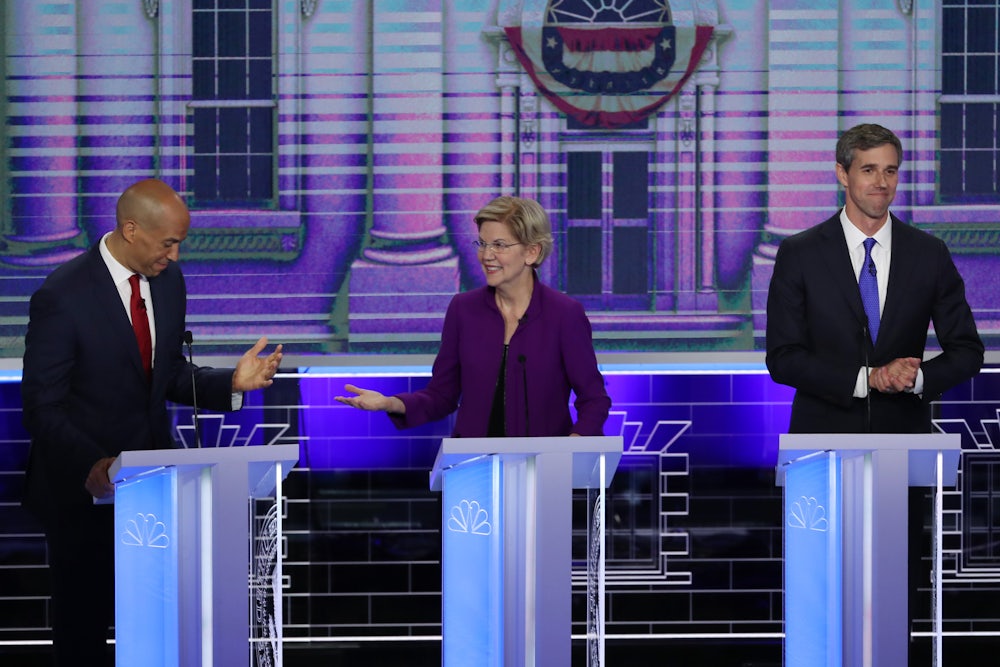For the last month, the Democratic National Committee has faced intense pressure to hold a debate specifically focused on the climate crisis—not just from environmental activists, but also from Democratic voters and the Democratic candidates themselves. While DNC Chairman Tom Perez has refused to accede to that pressure, he has publicly promised that this year’s debates will be different from previous election cycles, when the issue was all but completely ignored.
But Wednesday night’s debate did not clear even the low bar that Perez set. Over the course of two hours, approximately seven minutes were devoted to the top existential threat facing humanity. And only four of the ten candidates on stage were asked directly about how they intend to rapidly reduce carbon emissions over the next eleven years—something that must be done to preserve a livable planet for future generations.
The entire first half of the debate passed without a single climate-related question. Some candidates did address it: In response to a question about the economy, Elizabeth Warren referred to a “worldwide need for green technology.” Washington Governor Jay Inslee mentioned the issue, too—understandable, given his campaign’s undivided focus on global warming.
But those candidates took it upon themselves to address climate change, pivoting away from other subjects brought up by the moderators. This, naturally, caught the eye of environmental reporters—and royally pissed off activists who have been pushing for a climate-focused debate.
We're an hour into tonight's #DemDebate and there's been no direct question on #climatechange.
— Abby Smith (@AbbySmithDC) June 27, 2019
That's despite the DNC pledging to make it a top issue in the debates after refusing to host a full debate on the issue.
Dear @DNC,
— Sunrise Movement 🌅 (@sunrisemvmt) June 27, 2019
We're 1 hour into the #DemDebate and there have been ZERO climate qs.
You told us things would be different than 2016.
You told us the climate crisis was a priority for you.
Enough with your lame excuses. Enough hiding behind locked doors.
Host a #ClimateDebate. pic.twitter.com/EtRvvdH8Kx
The climate-related questions that were finally asked of the candidates, well into the second hour of the debate, were dismal. The first was a softball from Rachel Maddow, who asked Inslee if his plan to solve climate change would save Miami. “Yes,” Inslee said, “by abolishing the filibuster”—a reference to the GOP’s intransigence on climate issues in the Senate. Beto O’Rourke was given an opportunity to rattle off some talking points about how we’re going to “free ourselves from our dependence on fossil fuels,” without being pressed on how we’re going to do that. Julian Castro was asked if the federal government should be responsible for rebuilding people’s houses after flooding, and Castro quickly changed the subject to the damage Hurricane Maria did to Puerto Rico. Congressman Tim Ryan was asked about whether America should have a carbon tax, and Ryan ... well, let’s just say he did not talk about a carbon tax. (He preferred a distinctly Trumpian position of carping about the “forgotten” working class communities in his home state of Ohio.)
It was, to put it lightly, a disgrace—and not just because climate change was the number one issue that Democratic voters wanted to see discussed at the debate. The debate itself was held in Miami, Florida, a city that’s literally being swallowed by the rising ocean. As The New York Times pointed out on Tuesday, “New water pumps and tidal valves worth millions of dollars are needed to keep the streets from flooding even on sunny days. Septic tanks compromised by rising groundwater leak unfiltered waste that threatens the water supply. Developers are often buying out residents of established communities, hoping to acquire buildable property on higher ground.”
To respond to that reality, the debate’s organizers chose to devote seven minutes to climate change, 70 minutes into a 120-minute debate, as if it were a fifth-tier issue. Similar to humanity’s overall response to climate change, it was far too little and far too late.
